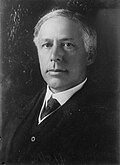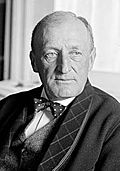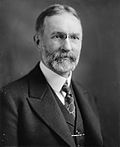| Case Name | Page and year | Opinion of the Court | Concurring opinion(s) | Dissenting opinion(s) | Lower Court | Disposition |
|---|
| Gorham Manufacturing Company v. Wendell | 1 (1923) | Taft | none | none | S.D.N.Y. | motions granted |
| Vandenburgh v. Truscon Steel Company | 6 (1923) | Taft | none | none | 6th Cir. | affirmed |
| Concrete Steel Company v. Vendenburgh | 16 (1923) | Taft | none | none | 2d Cir. | reversed |
| Charles Nelson Company v. United States | 17 (1923) | Taft | none | none | Ct. Cl. | affirmed |
| Crown Die and Tool Company v. Nye Tool and Machine Works | 24 (1923) | Taft | none | none | 7th Cir. | reversed |
| Eibel Process Company v. Minnesota and Ontario Paper Company | 45 (1923) | Taft | none | none | 1st Cir. | reversed |
| Pennsylvania Railroad Company v. United States Railroad Labor Board | 72 (1923) | Taft | none | none | 7th Cir. | affirmed |
| Moore v. Dempsey | 86 (1923) | Holmes | none | McReynolds | E.D. Ark. | reversed |
| Diaz v. Gonzalez | 102 (1923) | Holmes | none | none | 1st Cir. | reversed |
| United States Grain Corporation v. Phillips | 106 (1923) | Holmes | none | none | 2d Cir. | reversed |
| Rooker v. Fidelity Trust Company | 114 (1923) | VanDevanter | none | none | Ind. | dismissed |
| Great Northern Railroad Company v. Steinke | 119 (1923) | VanDevanter | none | none | N.D. | reversed |
| Kansas City Southern Railway Company v. Wolf | 133 (1923) | McReynolds | none | none | 8th Cir. | reversed |
| Minnesota Commercial Men's Association v. Benn | 140 (1923) | McReynolds | none | none | Minn. | reversed |
| United States Shipping Board Emergency Fleet Corporation v. Sullivan | 146 (1923) | McReynolds | none | none | Pa. Super. Ct. | dismissed |
| Durham Public Service Company v. City of Durham | 149 (1923) | McReynolds | none | none | N.C. | affirmed |
| Valley Farms Company of Yonkers v. Westchester County | 155 (1923) | McReynolds | none | none | N.Y. Sup. Ct. | affirmed |
| Douglas v. Noble | 165 (1923) | Brandeis | none | none | W.D. Wash. | reversed |
| Bank of America v. Whitney Central National Bank | 171 (1923) | Brandeis | none | none | S.D.N.Y. | affirmed |
| Lumiere v. Mae Edna Wilder, Inc. | 174 (1923) | Brandeis | none | none | S.D.N.Y. | affirmed |
| Price Fire and Water Proofing Company v. United States | 179 (1923) | Brandeis | none | none | Ct. Cl. | affirmed |
| New England Divisions Case | 184 (1923) | Brandeis | none | none | S.D.N.Y. | affirmed |
| United States v. Thind | 204 (1923) | Sutherland | none | none | 9th Cir. | certification |
| Brownlow v. Schwartz | 216 (1923) | Sutherland | none | none | D.C. Cir. | reversed |
| Cramer v. United States | 219 (1923) | Sutherland | none | none | 9th Cir. | reversed |
| Columbia Railway, Gas and Electric Company v. South Carolina | 236 (1923) | Sutherland | none | none | S.C. | reversed |
| Randall v. Tippecanoe County | 252 (1923) | Sutherland | none | none | Ind. | dismissed |
| United States v. Oklahoma | 253 (1923) | Butler | none | none | original | dismissed |
| Western and Atlantic Railroad v. Railroad Commission of Georgia | 264 (1923) | Butler | none | none | N.D. Ga. | order vacated |
| Paducah v. Paducah Railroad Company | 267 (1923) | Butler | none | none | W.D. Ky. | affirmed |
| Munter v. Weil Corset Company, Inc. | 276 (1923) | McKenna | none | none | D. Conn. | reversed |
| Davis v. Dantzler Lumber Company | 280 (1923) | McKenna | none | none | Miss. | reversed |
| Oklahoma Natural Gas Company v. Russell | 290 (1923) | Holmes | none | none | W.D. Okla. | reversed |
| United States v. Benedict | 294 (1923) | McReynolds | none | none | 2d Cir. | affirmed |
| Seaboard Air Line Railroad Company v. United States | 299 (1923) | Butler | none | none | 4th Cir. | reversed |
| Pothier v. Rodman | 307 (1923) | Taft | none | none | D.R.I. | docketing denied |
| City of New York v. New York Telephone Company | 312 (1923) | Taft | none | none | S.D.N.Y. | dismissed |
| United States v. Allen | 317 (1923) | McKenna | none | none | Ct. Cl. | affirmed |
| United States v. Moran | 321 (1923) | McKenna | none | none | Ct. Cl. | affirmed |
| Ewen v. American Fidelity Company | 322 (1923) | Holmes | none | none | 2d Cir. | reversed |
| Fox Film Corporation v. Knowles | 326 (1923) | Holmes | none | none | 2d Cir. | reversed |
| Pullman Company v. Richardson | 330 (1923) | VanDevanter | none | none | Cal. | affirmed |
| Oklahoma v. Texas | 340 (1923) | per curiam | none | none | original | boundary set |
| Work v. United States ex rel. Mosier | 352 (1923) | Taft | none | none | D.C. Cir. | reversed |
| United States v. Rider | 363 (1923) | Taft | none | none | Ct. Cl. | reversed |
| St. Louis-San Francisco Railway Company v. Public Service Commission of Missouri | 369 (1923) | McKenna | none | none | Mo. | reversed |
| Federal Land Bank of New Orleans v. Crosland | 374 (1923) | Holmes | none | none | Ala. | reversed |
| Arkansas Natural Gas Company v. Arkansas Railroad Commission | 379 (1923) | Sutherland | none | none | E.D. Ark. | affirmed |
| Baltimore and Ohio Railroad Company v. United States | 385 (1923) | Sanford | none | none | Ct. Cl. | affirmed |
| Layne and Bowler Corporation v. Western Well Works, Inc. | 387 (1923) | Taft | none | none | 9th Cir. | dismissed |
| Hallanan v. Eureka Pipe Line Company | 393 (1923) | Taft | none | none | W. Va. | dismissed |
| Hallanan v. United Fuel Gas Company | 398 (1923) | Taft | none | none | W. Va. | dismissed |
| Toledo Scale Company v. Computing Scale Company | 399 (1923) | Taft | none | none | 7th Cir. | affirmed |
| Keller v. Potomac Electric Power Company | 428 (1923) | Taft | none | none | D.C. Cir. | dismissed |
| Page Company v. Macdonald | 446 (1923) | McKenna | none | none | D. Mass. | affirmed |
| Phipps v. Cleveland Refining Company | 449 (1923) | McKenna | none | none | S.D. Ohio | affirmed |
| Gardner v. Chicago Title and Trust Company | 453 (1923) | Holmes | none | none | 7th Cir. | reversed |
| Wabash Railroad Company v. Elliott | 457 (1923) | VanDevanter | none | none | Mo. Ct. App. | reversed |
| Federal Trade Commission v. Sinclair Refining Company | 463 (1923) | McReynolds | none | none | multiple | affirmed |
| Hartford Life Insurance Company v. Douds | 476 (1923) | McReynolds | none | none | Ohio | affirmed |
| Great Lakes Dredge and Dock Company v. Kierejewski | 479 (1923) | McReynolds | none | none | W.D.N.Y. | affirmed |
| Thomas v. Kansas City Southern Railway Company | 481 (1923) | Brandeis | none | none | 8th Cir. | affirmed |
| Robinson v. United States | 486 (1923) | Brandeis | none | none | Ct. Cl. | affirmed |
| Pusey and Jones Company v. Hanssen | 491 (1923) | Brandeis | none | none | 3d Cir. | reversed |
| Omnia Commercial Company, Inc. v. United States | 502 (1923) | Sutherland | none | none | Ct. Cl. | affirmed |
| Russell Motor Car Company v. United States | 514 (1923) | Sutherland | none | none | Ct. Cl. | affirmed |
| Adkins v. Children's Hospital | 525 (1923) | Sutherland | none | Taft; Holmes | D.C. Cir. | affirmed |
| Watkins v. Sedberry | 571 (1923) | Butler | none | none | 6th Cir. | reversed |
| Hanson Lumber Company, Ltd. v. United States | 581 (1923) | Butler | none | none | 5th Cir. | affirmed |
| New York ex rel. Doyle v. Atwell | 590 (1923) | Sanford | none | none | N.Y. Sup. Ct. | dismissed |
| Baltimore and Ohio Railroad Company v. United States | 592 (1923) | Sanford | none | none | Ct. Cl. | affirmed |
| Hodges v. Snyder | 600 (1923) | Sanford | none | none | Kingsbury County Cir. Ct. | affirmed |
|












